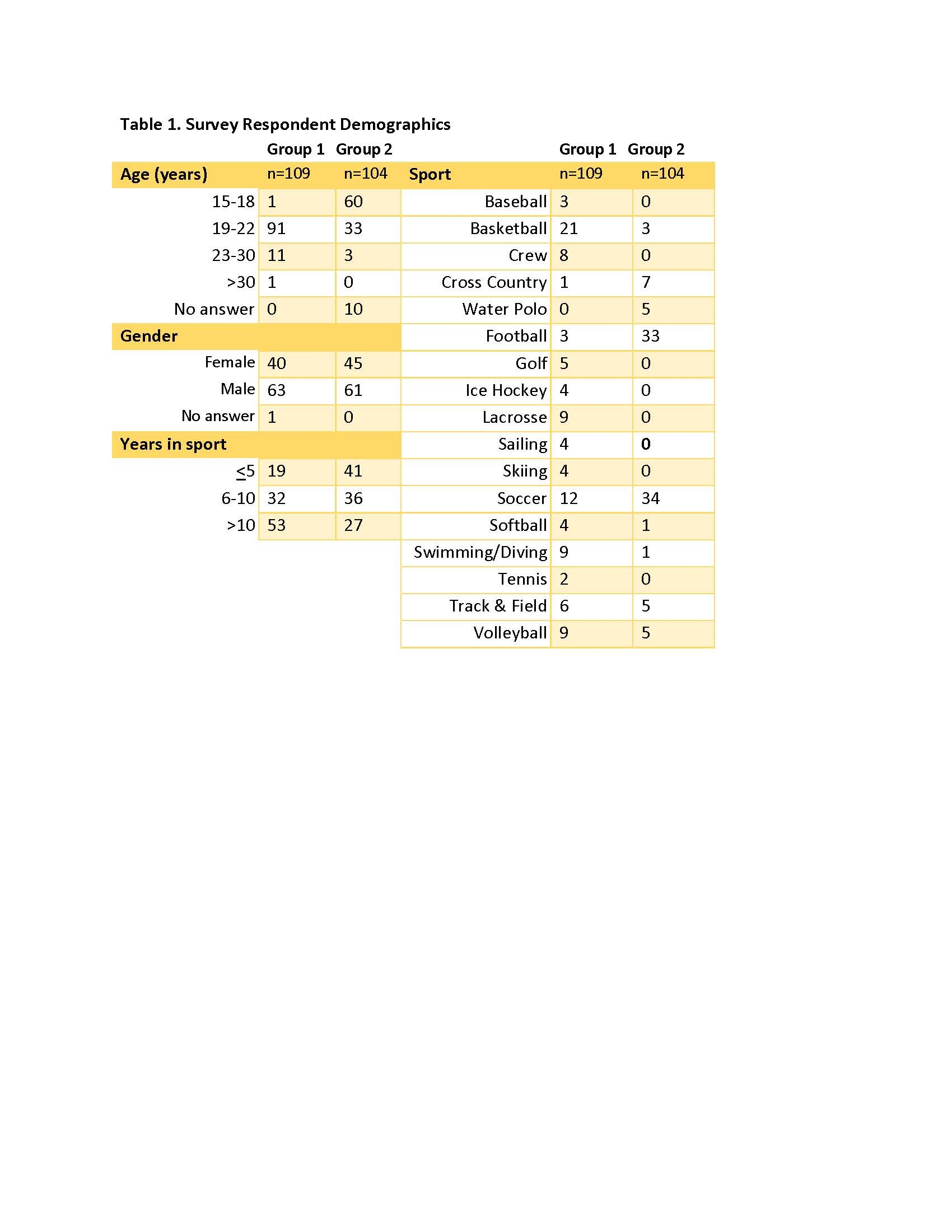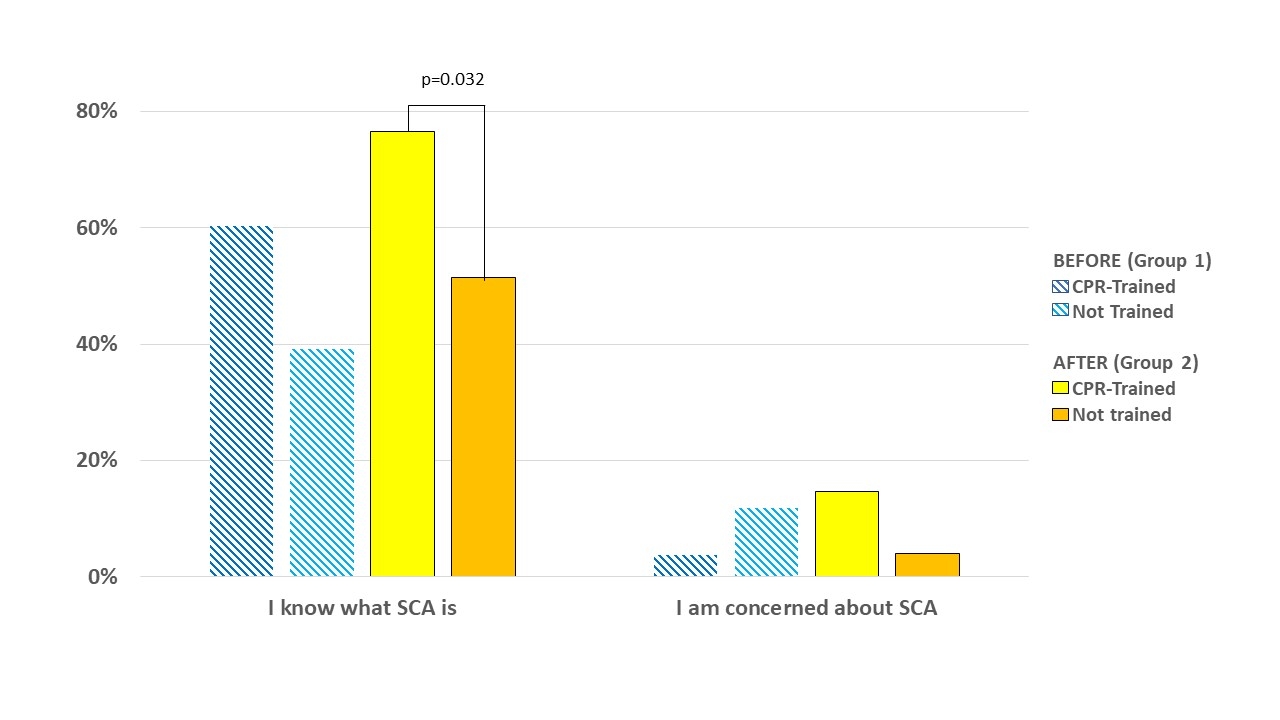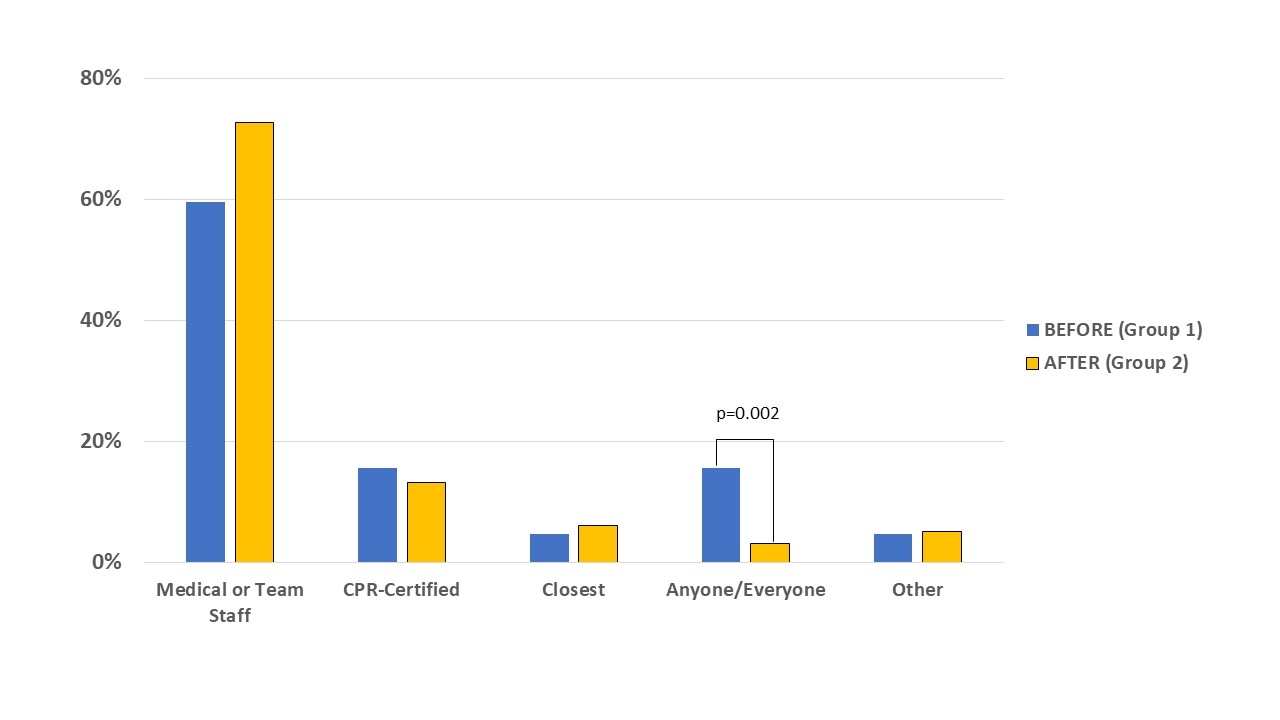Final ID: Su1401
Sports-related sudden cardiac arrest: Competitive athlete awareness before vs. after high-profile events
Abstract Body: BACKGROUND
Sports-related sudden cardiac arrest (SR-SCA) has captivated American attention following recent high-profile competitive athlete events.1 SR-SCA accounts for approximately 39% of SCA among <18 year-olds, and 13% of 19-25 year-olds in the U.S. Although the number of deaths due to SR-SCA is low, the loss of young life is devastating to families, friends, and communities.
HYPOTHESIS
We hypothesized that high-profile SR-SCA events would increase competitive athletes’ awareness of, concern about their personal risk, and sense of responsibility to respond to SCA.
METHODS
We performed a survey of competitive collegiate athletes. Group 1 (n=109) completed the survey in 2022 PRIOR to high-profile events. Group 2 (n=104) completed the survey in 2024. This study was approved by the University of Nevada, Reno IRB (2020866).
RESULTS
Table 1 details demographic information for our representative sample of athletes. Overall, there was no difference in answering “do you know what SCA is?” before v. after high-profile events (50.0% v 60.4%, p=0.1605). There was no increase in concern about personal SCA (7.7% v 7.8%, p=1.00), with very low percentage of athletes demonstrating concern. In both groups, more CPR-trained athletes compared to untrained reported knowing what SCA is (group 1 60.3% v 39.2%, p=0.079; group 2 76.5% v 51.4%, p=0.032). In group 1, CPR-trained athletes were less concerned than untrained about SCA (3.8% v 11.8%, p=0.255); this was reversed in group 2 with more CPR-trained athletes concerned about SCA (15.7% v 4.0%, p=0.074) (Fig 1). When asked “whose responsibility is it to resuscitate a fallen athlete,” the majority identified medical/team staff (59.6% v 72.7%, p=0.057), although significantly more athletes in group 1 identified anyone/everyone as potential rescuers (15.6% v 3.1%, p=0.002). A minority in both groups (4.6%, 6.1%) said whoever is closest (Fig 2).
CONCLUSION
Recent high-profile SR-SCA events have captured national attention and led to policy change, law passage, and significant funding efforts. However, the knowledge and perspectives of competitive collegiate athletes towards SR-SCA has not changed.
Sports-related sudden cardiac arrest (SR-SCA) has captivated American attention following recent high-profile competitive athlete events.1 SR-SCA accounts for approximately 39% of SCA among <18 year-olds, and 13% of 19-25 year-olds in the U.S. Although the number of deaths due to SR-SCA is low, the loss of young life is devastating to families, friends, and communities.
HYPOTHESIS
We hypothesized that high-profile SR-SCA events would increase competitive athletes’ awareness of, concern about their personal risk, and sense of responsibility to respond to SCA.
METHODS
We performed a survey of competitive collegiate athletes. Group 1 (n=109) completed the survey in 2022 PRIOR to high-profile events. Group 2 (n=104) completed the survey in 2024. This study was approved by the University of Nevada, Reno IRB (2020866).
RESULTS
Table 1 details demographic information for our representative sample of athletes. Overall, there was no difference in answering “do you know what SCA is?” before v. after high-profile events (50.0% v 60.4%, p=0.1605). There was no increase in concern about personal SCA (7.7% v 7.8%, p=1.00), with very low percentage of athletes demonstrating concern. In both groups, more CPR-trained athletes compared to untrained reported knowing what SCA is (group 1 60.3% v 39.2%, p=0.079; group 2 76.5% v 51.4%, p=0.032). In group 1, CPR-trained athletes were less concerned than untrained about SCA (3.8% v 11.8%, p=0.255); this was reversed in group 2 with more CPR-trained athletes concerned about SCA (15.7% v 4.0%, p=0.074) (Fig 1). When asked “whose responsibility is it to resuscitate a fallen athlete,” the majority identified medical/team staff (59.6% v 72.7%, p=0.057), although significantly more athletes in group 1 identified anyone/everyone as potential rescuers (15.6% v 3.1%, p=0.002). A minority in both groups (4.6%, 6.1%) said whoever is closest (Fig 2).
CONCLUSION
Recent high-profile SR-SCA events have captured national attention and led to policy change, law passage, and significant funding efforts. However, the knowledge and perspectives of competitive collegiate athletes towards SR-SCA has not changed.
More abstracts on this topic:
Practice Variation in Clinician Guidance Regarding Sport Participation in Congenital Heart Disease
Steinmetz Kristen, Petek Bradley, Churchill Timothy, Dean Peter, Edelson Jonathan, Flack English C, Mcgrath Lidija, Moulson Nathaniel, Shafer Keri, Weller Samantha
A Comparison of Synchronized Versus Unsynchronized Mechanical Chest Compressions in a Swine ModelMarill Keith, Menegazzi James, Gumucio Jorge, Salcido David



